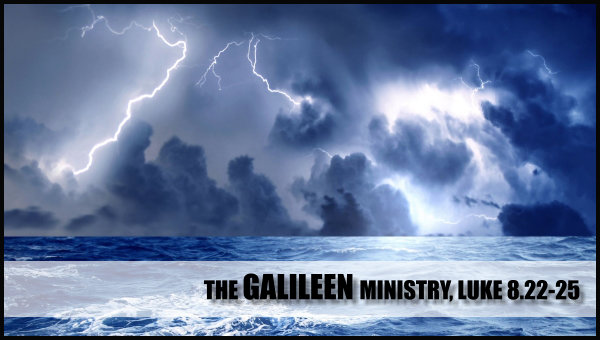By Tyson Thorne

The Galilean Ministry at Various Cities (4.14-9.50), 8.22-.25
How many great stories involve danger on the high seas? Noah’s Flood, Jonah, The Old Man and the Sea, A Perfect Storm? There is something greatly terrifying about being stranded in any great body of water. The account found in Luke chapter eight wouldn’t make the list, which is too bad as it has more to teach us than any of the others. So our story begins: On one occasion Jesus and his disciples decided to sail across the Sea of Galilee to the Gerasenes region. Along the way a great storm came up…
Many of the disciples were experienced boaters, so it is unlikely they would have set to sail if the weather looked harsh. Yet as anyone who has enjoyed boating can attest, storms can appear quickly over large lakes and open seas. Such was the case on this day. Most translation state “a violent windstorm came up” or something to that effect. The proper term for such a storm on water is a squall, and they can be dangerous and terrifying. The wind whips up the water creating large waves that easily crash over the short bows found on most inland boats. The danger of sinking is very real. And while all this was going on, where was Jesus? Asleep in the hull.
This is very reminiscent of another prophet that was sleeping in the hull of a ship when a violent storm came up, his name was Jonah (Yonah in Hebrew). He too calmed the waters, but only when he instructed the ship hands to toss him overboard. In that case it was his disobedience that was the cause of the storm, and God showed his sovereignty over the water and over the life of his prophet. In the case Luke presents the storm may have arisen so that God may once again prove a point, this time that Jesus (Yeshua in Hebrew) has authority over the wind and the sea. There may be good reason for the similarities.
Saint Augustine made a compelling case (in The City of God, and a letter he wrote to Deogratias in 409 AD) that Jonah was a prefigure of our savior. He wasn’t the only one to see this, however. Even Saint Jerome and Clement made some comparisons between the two. As unlikely as it may seem at first, what with Jonah being an angry, hateful man and Jesus being the very embodiment of God’s love and grace, there are strong evidences to suggest it is so. For example, Jonah sacrificed himself to save those aboard the ship and Jesus sacrificed himself to save all humanity. Jonah went from the ship to spend three days in the belly of a whale (something he described as descending into Sheol) whereas Jesus went from the cross to spend three days in the literal Sheol. Jonah was vomited up from “the grave” and Jesus resurrected from his tomb. Jonah spent 40 days in Nineveh after their repentance, and Jesus spent 40 days on earth following his resurrection.
For more information about these parallels and more, see our soon to be released book on Jonah coming this Christmas.
Getting back to our story, the disciples have moved from concern regarding the storm to fear as water began to fill the boat faster than they could bail. They woke Jesus who immediately commanded the storm to cease. In the quite that followed, as the waves subsided and gently lapped at the hull, the disciples talked amongst themselves wondering why the winds and water obeyed their teacher. This is the first in a series of evidences Luke provides to show that Jesus has all authority. In this instance it is authority over the nature world, next time we’ll see Jesus’ authority over the spirit world.
|
|
